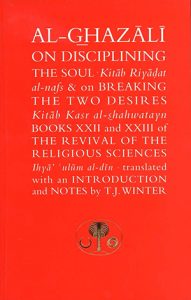Al-Ghazali on Disciplining the Soul & on Breaking the Two Desires (Ihya Ulumuddin Series No. 22 & 23)

Author: Imām Al-Ghazali
Translator: T.J. Winter (Abdal Hakim Murad)
Publisher: Islamic Texts Society
Year of Publication: 2016
Print Length: 384 pages
Genre: Islamic Studies / Quranic Studies; Theology, Ethics and Philosophy; Science, Reflection & Self-Development; Qur’anic Reflection, Supplication & Prayers; Non-Fiction / Religious Studies
Topic: Allah ﷻ, Prophet Muhammad ﷺ, Islam, Qur’an, Human Nature & Character, Human Psyche, Islamic Psyche, Ethics & Morality, Mindfulness, Eating & Drinking, Hunger & Starvation, Hope, Humanity, Sexuality, Sexual Etiquette, Spirituality
The spiritual life in Islam begins with riyadat al-nafs, the inner warfare against the ego. Distracted and polluted by worldliness, the lower self has a tendency to drag the human creature down into arrogance and vice. Only by a powerful effort of will can the sincere worshipper achieve the purity of soul which enables him to attain God’s proximity.
This translation of two chapters from The Revival of the Religious Sciences details the sophisticated spiritual techniques adopted by classical Islam. In the first step, On Disciplining the Soul, which cites copious anecdotes from the Islamic scriptures and biographies of the saints, Ghazali explains how to acquire good character traits, and goes on to describe how the sickness of the heart may be cured.
In the second part, Breaking the Two Desires, he focusses on the question of gluttony and sexual desire, concluding, in the words of the Prophet, that ‘the best of all matters is the middle way’.
The translator has added an introduction and notes which explore Ghazali’s ability to make use of Greek as well as Islamic ethics. The work will prove of special interest to those interested in Sufi mysticism, comparative ethics, and the question of sexuality in Islam.
Table of Contents
Al-Ghazāli’s Introduction to the Revival of the Religious Sciences
Abbreviations
Preface
Introduction
Notes to Introduction
THE BOOK OF DISCIPLINING THE SOUL, REFINING THE CHARACTER, AND CURING THE SICKNESSES OF THE HEART
Prologue
1. An Exposition of the Merit which is in having Good Character, and a Condemnation of Bad Character
2. An Exposition of the True Nature of Good and Bad Character
3. An Exposition of the Susceptibility of the Traits of Character to Change through Discipline
4. An Exposition of the Means by which Good Character may be Acquired
5. An Exposition of the Symptoms by which the Diseases of the Heart may be Recognised, and the Signs which Indicate a Return to Health
6. An Exposition of the Way in which a Man may Discover the Faults in his Soul
7. An Exposition of the Evidence Handed Down from Men of Spiritual Insight and Provided in the Law to the Effect that the Way to Cure the Diseases of the Heart is by Renouncing one’s Desires, and that the Stuff of such Diseases is Following Desires
8. An Exposition of the Signs of Good Character
9. An Exposition of the Way in which Young Children should be Disciplined, and the Manner of their Upbringing and the Improvement of their Characters
10. An Exposition of the Requirements of Aspirancy, the Preliminaries to Spiritual Struggle, and the Progressive Induction of the Aspirant in Treading the Path of Disciplining
THE BOOK OF BREAKING THE TWO DESIRES
Prologue
1. An Exposition of the Merit of Hunger and a Condemnation of Satiety
2. An Exposition of the Benefits of Hunger, and the Evils of Satiety
3. An Exposition of the Method by which Discipline is Used to Break the Greed of the Stomach
4. An Exposition of the Variance in the Rule and Merit of Hunger in Accordance with the Circumstances of Men
5. An Exposition of the Ostentation which may Proceed from the Renunciation of Desirable Foods and from Eating Frugally
6. A Discourse on Sexual Desire
7. An Exposition of the Aspirant’s Obligations Regarding the Renunciation or Contraction of Marriage
8. An Exposition of the Merit of him who Counters the Desire of the Sex and the Eye
Notes
Appendix I: Persons cited in Text
Appendix II: Translations of the Revival into European languages
Appendix III: The Wonders of the Heart
Bibliography
Index to Qur’ānic Quotations
General Index

Imām Abu Hamid al-Ghazali is a 11th century Muslim scholar. He was one of the most prominent and influential philosophers, theologians, jurists, and mystics of Sunni Islam. Al-Ghazālī was born at Ṭūs (near Mashhad in eastern Iran) and was educated there, then in Jorjān, and finally at Nishapur (Neyshābūr), where his teacher was al-Juwaynī, who earned the title of imām al-ḥaramayn (the imam of the two sacred cities of Mecca and Medina). He was active at a time when Sunni theology had just passed through its consolidation and entered a period of intense challenges from Shiite Ismâ’îlite theology and the Arabic tradition of Aristotelian philosophy (falsafa). Al-Ghazâlî understood the importance of falsafa and developed a complex response that rejected and condemned some of its teachings, while it also allowed him to accept and apply others. His great work, Iḥyāʾ ʿulūm al-dīn or Ihya Ulumuddin (“The Revival of the Religious Sciences”), made Sufism (Islamic mysticism) an acceptable part of orthodox Islam.
Source: https://plato.stanford.edu/entries/al-ghazali/
More from Imam al-Ghazali in this library, click here.

Abdal Hakim Murad / T.J. Winter is the Founder and Dean of Cambridge Muslim College. He was educated at Cambridge, Al-Azhar and London universities. He is currently the Shaykh Zayed Lecturer of Islamic Studies in the Faculty of Divinity at Cambridge University and Director of Studies in Theology at Wolfson College. He has published and contributed to numerous academic works on Islam, including as Director of the Sunna Project, and is a leading figure in inter-faith activity, notably as one of the signatories to the Common Word statement. He is well-known as a contributor to BBC Radio 4’s ‘Thought for the Day’.
Source: https://www.cambridgemuslimcollege.ac.uk/ahm/
More from Abdal Hakim Murad / T.J. Winter in this library, click here.
